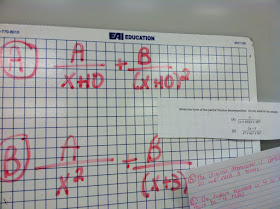We tried a modified version of Bowman’s Mistake Game in
PreCalc this week to review for an upcoming game. I split the class into six groups and gave
each group a problem to work. Then I
gave them these:
Directions
·As a group, work your given problem correctly. Then, have me check your answer.
·Once you have a correct answer, work the problem incorrectly,
hiding your mistake as cleverly as possible.
Your "mistake" must be a true pitfall of the given problem
(i.e., what kinds of conceptual errors would students likely
make?). Your error cannot be a simple
arithmetic or algebraic mistake.
·When you're happy with your lie, put it on a whiteboard (no need
to write out the original question).
·When every group is done, you will find the errors on the other
whiteboards and vote on the group with the sneakiest mistake. Winners get candy. :)
After everyone had looked
through and analyzed each group's whiteboard, I brought the boards to the front and had a
student from each group summarize the mistake one more time.
 |
| They taped the original question face-up and the mistake face-down |
Then, students voted on the best
error. We had previously discussed that
the errors needed to be conceptual, big-picture mistakes. Something that would tell me, “Uh, this kid
doesn’t really know what’s going on here…”
Not something like forgetting to distribute a negative or simplifying
incorrectly.
Before the kids left, I had
them give me one mistake they promised not to make, write it on a post-it note,
and stick it to my door on their way out.
I plan on leaving these up as
they enter the door tomorrow so they can be reminded of those promises right
before they start the test.
_____________
Aside, and probably more important...
As usual, my first run at this activity wasn't perfect. There's a lot that needs to be changed. It's easy for me to get discouraged when an activity doesn't go exactly as I had planned. But I've been thinking lately (dangerous, I know):
(1) My class activities have to start somewhere; they can't just magically be perfect...isn't that what we tell our kids: you have to practice and have patience if you want to become really good at something? I guess the same goes with becoming good at making the students do the work. Learning how to scaffold; learning how to ask engaging questions; learning when to step in and when to stay out. This takes a lot of practice. No matter how much preparation I put into a lesson or activity, I have to practice delivering it, too...and that can't be done without kids in the room.
(2) My students have to be taught how to talk about math. It's a language. Providing places for them to talk about what they're learning is great...but I can't expect that the conversations will just magically happen. If the conversations aren't flowing quite as well as I'd like, it's a-ok. It probably means we're doing good stuff here, actually. Because we're practicing something they're not particularly good at...yet.




Love this, Rebecka! The whole idea of "come up with the best error you can" is truly a great one. I will use this in my own classroom as soon as I get the chance. Thanks, as always, for your great blog posts!!
ReplyDeleteLet me know how it goes and how you make it better. Still needs to be tweaked...just not quite sure how.
DeleteI like the idea. Thank you for sharing!
ReplyDeleteinbox by gmail